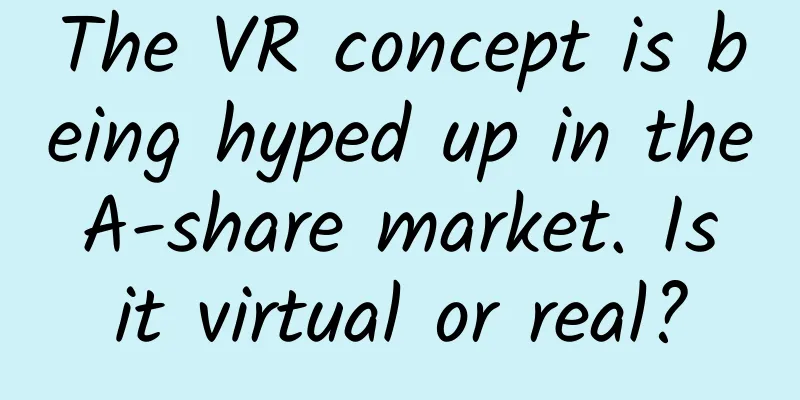The VR concept is being hyped up in the A-share market. Is it virtual or real?

|
At the end of last year, VR company Ant Vision Technology received a RMB 300 million investment from A-share listed company Gosuncn (stock code 300098). Subsequently, some technology media questioned the amount of Ant Vision's financing in this round based on the announcement released by Gosuncn, which attracted attention from the industry. Regardless of the truth behind this, at least through this incident, we can vaguely see the rather subtle relationship between VR startups and A-share listed companies. A shares need concepts January 7, 2016, the fourth day of trading after the new year, was also the second trading day when the circuit breaker mechanism was triggered. The day before, in Las Vegas, the US Consumer Electronics Show (CES), which is regarded as the annual trendsetter by the technology industry, kicked off. On that day, VR was already very prominent at the show. It is reported that consumer VR helmets from Facebook, Samsung, Sony and HTC will be on the same stage for the first time. In the early morning of the 7th, the number of pre-orders for Oculus CV1 exceeded 3 million. This time, along with the concept of “the first year of VR”, the information released also included – “concept stocks will see a surge in prices”. The technology media have already begun to cheer for the stock market, which shows how hungry A-shares are for concepts. In the eyes of industry insiders, this is nothing new: "Generally speaking, the stock market either makes money from the central bank by lowering interest rates, or makes money from companies by increasing profits, or makes money from retail investors by cutting leeks. During this period, there was no interest rate cut, and the economy was bad, so companies had no profits, so they could only use concepts." Judging from last year’s performance, VR is indeed a “useful” concept for A-shares. Wind Index data shows that the virtual reality index has increased by 167.71% since last year, and the cumulative increase in the last two months of last year was 58.12%. It seems that the wave of VR in A-shares will only be more fierce this year. VR is not a general concept According to incomplete statistics, there are more than 20 VR concept stocks in the A-share market, and this number is still growing. Lou Chi, CEO of Fireworks Workshop, pointed out in his answer on Zhihu that except for Baofeng and Goertek, the secondary market has basically nothing to do with VR. If we do not limit it from the technical level, Shunwang Technology, which cooperates with HTC to promote offline channels, can also be regarded as having a direct relationship with VR. Even so, among VR concept stocks, the number of companies that are truly related to VR is less than 15%. Investors will inevitably worry whether VR is just an empty shell played by A-shares? After all, there have been many concepts played by A-shares in the past two years. So, will VR also start to decline after the hype value is used up, just like 3D and 4K? From what we have learned, both practitioners and investors are full of confidence in the rise of the VR industry. Lingjing CEO Zhang Shubin said that unlike the concepts brought about by local technological innovations such as 3D and 4K, VR is not just a technical level. In the future, it will bring qualitative improvements to the experience of many industries and content. Chen Chaoyang, founder and CEO of Dapeng VR, combined the grand occasion of more than 70 VR companies participating in the CES this year, and said that this is an industry completely different from 3D, and it is only a matter of time before it explodes. A senior investor was more resolute: "VR is bound to grow, there is no doubt about that." To explain, borrowing Lou Chi's point of view, the core value of VR lies in the right to distribute traffic in 5-10 years. In the view of analysts, "the hype of the VR concept is both accidental and inevitable. What is accidental is the timing of the hype, and what is inevitable is the need for hype." In other words, VR is not a hyped concept. Even without hype, what is supposed to happen will happen sooner or later. Hype is also a good thing Using concepts to drive the secondary market, listed companies are undoubtedly the most direct beneficiaries. Speaking of this, one cannot help but think of Baofeng Technology, which created a myth of 29 consecutive daily limit increases with the VR concept. Some people criticized that Magic Mirror is too childish, that Baofeng does not have the core technology of VR, and that behind the 30 billion market value is a huge capital bubble. However, it must be admitted that as a listed company with the closest relationship with VR, the existence of Baofeng is a positive signal for both entrepreneurs and investors. The increase in stock prices is conducive to the further implementation of Baofeng's strategy. To put it bluntly, without money, concepts will always be just concepts. With money, there is at least the possibility of turning "exaggerated bullshit" into reality. It is the emergence of VR concept stocks that has rapidly made VR more widely recognized, especially among stock investors, which has invisibly educated the VR market and future consumers. From the perspective of VR entrepreneurs, the more attention listed companies pay, the greater the investment opportunities they will get. Zhang Shubin believes that compared with 2015, the investment amount in the domestic VR industry in 2016 will increase several times. According to Tencent Games statistics, 29 domestic VR companies raised more than 1 billion RMB in financing in 2015. According to Zhang's prediction, several billion RMB will be invested in VR this year. What changes will this money bring to the VR industry? The timing of the primary market is right, and content may be a new round of investment hotspot Some investors predict that more listed companies will enter the VR field this year through mergers and acquisitions or cooperation. This trend has been reflected in the relevant movements of listed companies. At the end of last year, LeEco, New Oriental, Tencent, Xiaomi, Xunlei and other "star" listed companies have successively "established relationships" with VR, which shows how tempting this big cake regarded as the "next generation computing platform" is. Peng Fan, co-founder of Qixin Yiwei, believes that the participation of listed companies will promote the rapid integration of the VR industry chain. Like all other investment fields, the cooperation between listed companies and start-ups is not convincing enough if it only stays at the capital level. Taking the investment of Gaoxinxing as an example, Qin Zheng, CEO of Ant Vision, told us that this cooperation was reached on the basis of actual investigation and prospect analysis. The two sides have points of convergence in many aspects, and there will be a lot of actual business in the future, such as expanding virtual reality applications on the B-side. The relationship between capital and entrepreneurs is similar to the relationship between water and grass and sheep - the latter will instinctively migrate to where the former is rich in resources. The popular O2O is a typical example. This time, the preference of capital will also attract a group of new entrepreneurs to join. "As competition intensifies, the elimination rate will also increase, and companies with low business barriers and lack of core technologies will be the first to be eliminated." This is the analysis of a VR practitioner who did not want to be named. According to what we have learned from the investment field, the injection of a new round of capital may bring greater opportunities to related startups such as content, underlying or segmented technologies, and offline channels. VR experience centers are also one of the models that are favored. This coincides with the view of the industry. As a VR hardware practitioner, Chen Chaoyang believes that over the past year, investment in the VR field has been mostly concentrated on hardware, and the industry has reached a point where it needs content. Peng Fan analyzed: "Large companies will not invest too many resources in technologies in niche areas. These technologies are also very important for the overall realization of VR, such as eye tracking, motion capture, gesture recognition, etc." Qixin Yiwei is a startup company focusing on eye tracking technology. In the field of VR content creation, Lanting Digital co-founder Zhuang Jishun believes that start-up companies that find their own positioning and enter the vertical field will have greater opportunities. On the contrary, hardware products are rarely mentioned by investors. Perhaps everyone is still waiting for the giants to show up and kick off the helmet show. The secondary market is still early to mature and individual stock investments should be made with caution "The primary market is in a very good investment period" and "VR is in the high-risk VC stage". Investment advice given by professionals is mostly concentrated on the primary market. In comparison, investors' investment advice on the secondary market is much more conservative. "From the hype of concept stocks, it is obvious that there is a lack of A-share VR targets. There are almost no pure VR listed companies. Without performance support and accurate sales forecasts, concepts are not enough to support stock prices." "The VR industry is basically full of startups. It will take some time for them to truly enter the secondary market. I will not recommend individual stocks in the secondary market at this time." The rational suggestions of investors are basically in line with the current situation of the VR market, but the performance of A-share prices has never been related to fundamentals. It seems that whether you can make a quick buck from this round of hype depends on your courage and luck. At present, the VR industry is still very immature and is in the stage of capital-driven development. It is an indisputable fact that A-shares are hyped up by VR concepts. Although there is a capital bubble here, it is also a good thing for both parties. While the secondary market is promoted, it will in turn promote the development of the primary market. The injection of more capital will accelerate the internal competition in the industry. Those who join in the fun will be eliminated first, and valuable ones will be further accumulated. It is also possible that after this round of hype, VR will experience a cooling-off period. In the end, whether VR will become a concept ruined by the A-share market depends on whether practitioners are treating VR as a story or a belief. As a winner of Toutiao's Qingyun Plan and Baijiahao's Bai+ Plan, the 2019 Baidu Digital Author of the Year, the Baijiahao's Most Popular Author in the Technology Field, the 2019 Sogou Technology and Culture Author, and the 2021 Baijiahao Quarterly Influential Creator, he has won many awards, including the 2013 Sohu Best Industry Media Person, the 2015 China New Media Entrepreneurship Competition Beijing Third Place, the 2015 Guangmang Experience Award, the 2015 China New Media Entrepreneurship Competition Finals Third Place, and the 2018 Baidu Dynamic Annual Powerful Celebrity. |
<<: Li Shufu, the "disruptor": The Internet cannot subvert the automotive industry
>>: Korean media: Chinese manufacturers plagiarize and dilute the influence of Korean products
Recommend
A collection of the pitfalls you will encounter when adapting to iOS 9
[[151640]] This article mainly talks about some p...
Although whole grains are good, you may mistake them for fine grains! Don’t learn these 6 ways of eating...
Nowadays, many people are pursuing a healthier di...
A major benefit for information flow advertising, “Super” Fans Pass is coming! Attached effect case
I believe that friends in the channel circle have...
Will the third-party ROM flashing trend reappear?
For those who have experienced the early "fla...
PwC: 2025 Global CEO Survey Report
PricewaterhouseCoopers (PwC)’s 28th annual Global...
How does Tmall create anthropomorphic IP?
People say that the "New Year atmosphere&quo...
Why can the itinerary code still find you even if your phone is turned off? The reason is this!
The travel code is open! " "Health code...
The essence of APP product operation, passionate speeches by operation masters such as Didi and Meitu
Didi Product Director Ye Keji: The core of produc...
Peking University Feng Ke: Learn supply chain finance and Internet finance from scratch [Insights]
Peking University Feng Ke: Learn Supply Chain Fin...
Why can’t the word “official website” be added to the creative title of Baidu promotion?
Friends who are engaged in Baidu bidding know tha...
Can air fryers produce carcinogens? How to use them healthily
In recent years, many families have bought air fr...
Guangzhou shared power bank mini program has customized functions. How much does the shared power bank mini program cost?
With the advent of the 5G era, the network speed o...
Tesla's logic and troubles in moving eastward: There are still three major problems to be solved in building a factory
The rumor was eventually debunked in the clarific...
China Automobile Dealers Association: China's used car manager index was 43.8% in December 2021
On January 6, 2022, the China Automobile Dealers ...
Kuaishou’s tips on how to create hits!
As a social method for the younger generation, &q...









